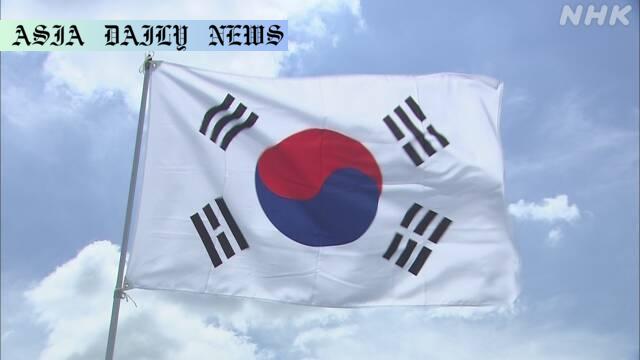Japan-US Tariff Talks focus on better trade alignment.
Focus on Japan-US tariff talks as a key reference for South Korea.
South Korea’s ministers to meet with prominent US officials.
First Japan-US meeting concludes as exploratory talks.
President Trump’s unexpected participation noted.

Introduction: Significance of Trade Talks
As the global economy navigates complexities, tariff negotiations between major economies like Japan and the United States hold particular significance. Currently, the ongoing talks between the US and Japan are being closely observed by South Korea, especially as its finance and industry ministers plan visits to Washington next week. These negotiations not only have implications for global trade but also serve as critical reference material for South Korea in planning its strategies and aligning its trade goals with the US.
Overview of the Japan-US Tariff Talks
The recent Japan-US tariff talks in Washington serve as a focal point for global economic analysts. Sources from Yonhap News Agency reported the inaugural session was exploratory, signaling the foundational nature of these discussions. While a full-fledged agreement remains a distant objective, the talks represent a vital step toward aligning trade policies and addressing mutual concerns. Interestingly, President Donald Trump’s participation in the talks was perceived as a strategic surprise, as Japanese officials initially anticipated a focus on ministerial-level discussions. This shift highlights trade’s rising stature as a top-tier issue within international relations.
The South Korean Perspective
With tariff negotiations underway, South Korea finds itself at a pivotal crossroads in preparing for impending discussions with the US. Deputy Prime Minister Choi Sang-mok, in his capacity as Minister of Economy and Finance, is expected to hold talks with US Treasury Secretary Scott Bessent. Similarly, Industry Minister Ahn Duk-geun’s visit to the US to meet with Commerce Secretary Howard Lutnick signals a multi-dimensional approach to strengthening Korea-US economic relations. South Korean media’s extensive coverage underlines the talks’ importance and South Korea’s eagerness to leverage lessons from the Japan-US discussions.
Exploratory Talks: A Prelude to Future Agreements
The initial session of the Japan-US tariff talks concluded without any major breakthroughs, emphasizing a cautious yet realistic approach to finding common ground. Reports suggest that both nations are willing to continue negotiations to address pertinent issues such as tariff reductions, regulatory alignments, and trade barriers. The exploratory tone of these discussions sets a preparatory stage for further, more concrete engagements later this month, reflecting the complexity and stakes involved in international trade policies.
Anticipated Impacts on South Korea
South Korea stands to gain significantly from observing and analyzing the developments emerging from the Japan-US talks. The talks’ outcomes could shape South Korea’s negotiation strategies, offering valuable insights into aligning its policies with US expectations. Furthermore, South Korea’s proactive engagement signifies its determination to stay ahead of potential trade shifts, ensuring its economic stability amidst a dynamic global trade environment.
Compounding Regional Dynamics
The developments in Japan-US tariff negotiations also underscore broader regional dynamics in Asia’s economic landscape. The interdependence between the US and major Asian economies stresses the need for collaborative efforts to address trade complexities. South Korea’s close observation of these negotiations reflects its understanding of the intricate ties between regional and global economic policies while highlighting the importance of maintaining a balanced approach amid shifting alliances and trade strategies.
Conclusion: Moving Towards Global Trade Harmony
The Japan-US tariff talks and the subsequent activities by South Korean ministers reflect the shifting dynamics of East Asian trade policies. Such discussions not only foster bilateral relations but also serve as a reminder of the importance of global trade harmony. As South Korea prepares for its discussions in the US, the lessons drawn from the ongoing Japan-US negotiations could play a crucial role in ensuring progressive collaboration and mutual benefits for all parties involved.



Commentary
Introduction: The Modern Significance of Tariff Discussions
Discussions around tariffs often seem like a niche topic restricted to policymakers and economists, but their implications echo through the lives of ordinary citizens and businesses alike. In today’s globally interconnected economy, these discussions reflect the priorities, challenges, and hopes of nations engaging in trade diplomacy. As the world pays attention to the ongoing talks between the US and Japan, South Korea’s engagement adds another layer of depth to the story. It’s a chance for the region to unite, negotiate meaningfully, and strive for sustainable growth.
Tariff Negotiations: Complexity Amid Collaboration
Tariff policies cater to a fine balance between protecting domestic interests and fostering international trade. This balance often translates into intense negotiations that demand clarity, integrity, and persistent diplomacy. The surprising presence of President Trump in the early rounds of Japan-US talks underscores the gravity of these negotiations. With South Korea preparing for similar discussions, the intricate dance of trade agreements provides not only challenges but opportunities for stronger economic alliances in a rapidly evolving global trade framework.
Implications for South Korea’s Strategy
South Korea’s keen observation of Japan-US talks demonstrates its forward-thinking approach to negotiations. With its ministers poised to interact with US counterparts, South Korea is clearly underscoring the value of preparation and adaptation. These engagements also underline economic diplomacy’s role as a cornerstone of modern international relations. As a country familiar with navigating delicate geopolitical situations, South Korea’s posture could serve as a model for other nations dealing with global trade issues.
Conclusion: A Collaborative Way Forward
As the elements of global trade continue to shift, nations like Japan, the US, and South Korea must engage in constructive dialogues to address shared challenges. From tariff reductions to regulatory harmonization, these discussions indicate a willingness to find mutual benefits. With South Korea carefully calibrating its strategies and leveraging lessons from Japan-US dialogues, the region could witness a more stable and interconnected economic future. Indeed, the dynamics of these negotiations should inspire hope, innovation, and collective progress.